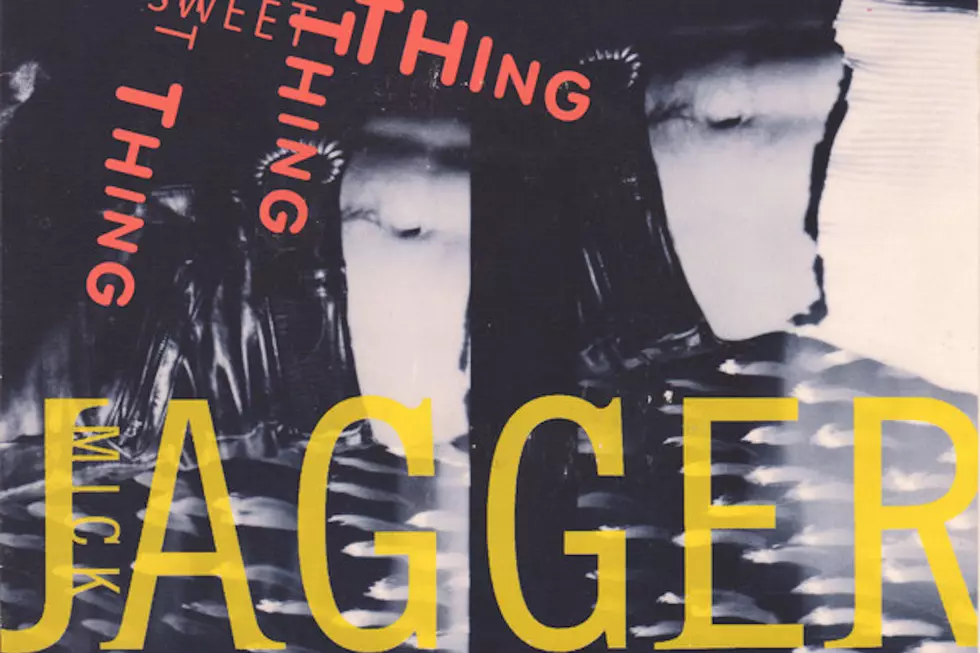
30 Years Ago: Mick Jagger Channels the Rolling Stones on ‘Sweet Thing’
Mick Jagger has firmly stated over the years that he did not think singing would be his lifelong career – and he didn't want it to be. Of course, things turned out far differently.
He was still singing in 1993 as he turned 50, an age that some fans probably didn't ever think Jagger would ever reach. Fewer still might have guessed he'd be working full-time as one of rock's most prominent frontmen. This was a new, somewhat uncertain era, as middle age set in and it become clear — to the chagrin of some fans – that even the most exuberant of artists must yield to the passage of time.
"People have this obsession," Jagger told the Observer in 1993. "They want you to be like you were in 1969 because otherwise, their youth goes with you. It's very selfish, but it's understandable."
To be clear, Jagger was not overly concerned with his age. "It always makes you set a lot more store by it than you should really be bothered with," he told Esquire in 1993. Still, it had become common to ask how long the Rolling Stones could keep up – both as a band and as individual members.
They'd seemingly cheated death again and again, outlasted the Beatles two times over, and embarked on solo careers. Yet there was no indication that the Stones would stop being the Stones anytime soon – or that Jagger would stop being Jagger. "I mean, as long as you can deliver the goods, I think — compose and sing and make the record and perform," he told Esquire. "I never seem to tire of writing and performing. I love putting on those big shows."
By then, Jagger had already released two solo albums, 1985's She's the Boss and 1987's Primitive Cool, both of which attempted to formulate an identity apart from the Rolling Stones. To an extent, Jagger recognized that the style of music on which he had ridden to fame as a young man would not necessarily carry him through the rest of his career.
"I still love performing [rock music], but it's no longer a new, evangelical form," he told Rolling Stone in 1995. "It's still capable of expression, and it's capable of change and novelty, but it's not as exciting for me. It's not a perfect medium for someone my age, given the rebelliousness of the whole thing, the angst and youth of it. In some ways, it's foolish to try and re-create that." Jagger was mostly concerned with writing the kind of music that moved him, rather than whatever might be considered high-brow. "I don't really care," he said in one 1993 TV interview. "I'm not here to be taken seriously."
Watch the Video for Mick Jagger's 'Sweet Thing'
"Sweet Thing" was one such song, the last to be cut for Jagger's third solo album, Wandering Spirit. It wasn't unlike something the Stones might have conjured up on a previous album, but with a slinkier, more R&B-influenced dance groove. "I have been more relaxed with doing songs that were styles I touched on before in the Stones," he told The New York Times.
Courtney Pine, a well-regarded British jazz musician, added a searing saxophone solo on the track. "It was a great challenge for me," Pine told MTV back then. "Hopefully, this will break the stereotypes. I'm not really going to limit myself to playing one type of music. I listen to this kind of music, so why shouldn't I attempt to play it?"
Guitarist Jimmy Rip later described the results as "kind of a throwaway dance song" but Jagger's record label, Atlantic, loved it. "They said, 'Oh no, this is fabulous! Dance music is so big and this is going to be the hit from the record!'" Rip told UCR in 2022.
Jagger and Rip both wanted another song, "Don't Tear Me Up," to be used as the album's lead single. Jagger explained, however, that in this case, it was best to allow Atlantic the decision: "Mick finally said to me, 'Look, I could insist but if you insist, the company won't put their whole heart into promoting it," Rip said, "and then when it fails, they'll say, 'You see, we told you; you should have listened to us.' So you've got to kind of let them do the thing that they're passionate about.'"
It didn't quite work out the way Atlantic hoped. "Sweet Thing" only reached No. 84 on the Billboard Hot 100. Still, the single enjoyed a good deal of radio play and its music video aired regularly on MTV. Jagger took ownership of the set, describing the accompanying clip as an "extension of the song." Various actresses were featured, along with Jagger's signature dance moves. "You want to be part of your work," he explained to MTV. "Jagger's a superstar," John Cannelli, MTV's senior vice president for music and talent, told Times.
"He came to us with a great song and video that we felt our audience would be passionate about." After Wandering Spirit arrived, MTV pointed out that fans noticed some songs were similar to the Rolling Stones' disco-infused era. "So what?" Jagger replied. "As long as they're good."
At some point along the way, Jagger had come to terms with the idea of being a singer for the rest of his life. If he could write songs like "Sweet Thing" that touched on the past while also looking to the future, suddenly that didn't seem like such an imprisoning reality any longer.
"I feel that I'm tied to myself as a kind of traditional musician and a singer, and the history that I have ties me down," he told Rolling Stone. "But I'm much less tied down than with the Rolling Stones. I can go in any direction that I want."
Rolling Stones Solo Albums Ranked
You Think You Know the Rolling Stones?
More From KKTX FM










